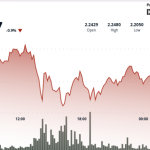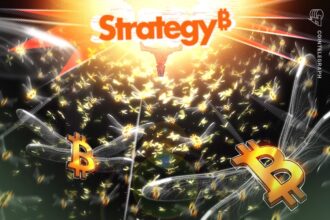Robinhood Blockchain Initiative Faces Regulatory Hurdles and Market Disruption Potential
Galaxy Digital Analysis Cites Competitive Threat to Established Exchanges
Robinhood’s plan to tokenize stocks on its Ethereum-compatible “Robinhood Chain,” built on Arbitrum Orbit, could significantly shift trading volume away from traditional venues like the NYSE, according to Galaxy Digital in a Friday report. This planned move challenges the liquidity and activity that underpin the dominance of major traditional finance (TradFi) exchanges.
At the EthCC conference, Robinhood CEO Vlad Tenev unveiled plans for this new blockchain infrastructure. Tenev emphasized features including direct on-chain trading of tokenized derivatives, settlement outside traditional exchange hours, and self-custody options for users. The initiative leverages Robinhood’s recent acquisition of crypto exchange Bitstamp and mirrors rollup architectures, allowing Robinhood potentially to capture all transaction fees by controlling the sequencer.
Galaxy Digital stated that by minting token “wrappers” linked to real stocks (custodied by a US broker-dealer), Robinhood will offer near-instant settlement and extended trading hours, targeting a 24/7 model. “This directly challenges the deep concentration of liquidity and activity that gives major TradFi exchanges (e.g., NYSE) their competitive advantage,” the research firm noted.
Key features attracting users include programmability, such as using tokenized stocks as collateral or automating dividends – advantages unavailable through traditional equities. If incumbent exchanges cannot match this utility, they risk losing market share to blockchain-based platforms.
However, concerns remain. The removal of pre-market and after-hours limitations could expose retail investors to sharp price movements outside scheduled market hours. Additionally, regulatory uncertainty looms large. While the offering is currently restricted to EU users, the US Securities and Exchange Commission (SEC) has not commented publicly on the model. Industry group SIFMA has warned the SEC to reject tokenized equities traded outside Regulation NMS.
As the initiative progresses, the conflict between decentralized trading advantages of the Robinhood Chain and clear regulatory boundaries associated with the TradFi market remains central to its success.












